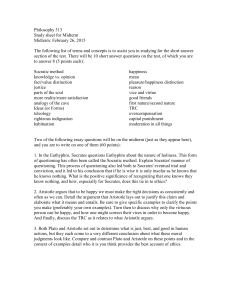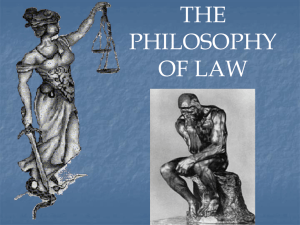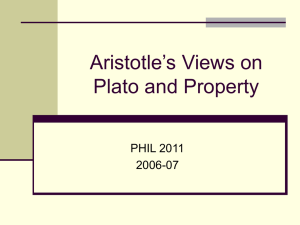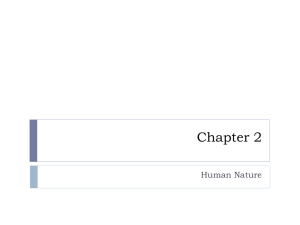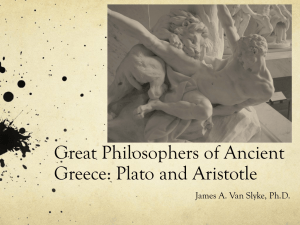Natural Law Philosophers Powerpoint
advertisement
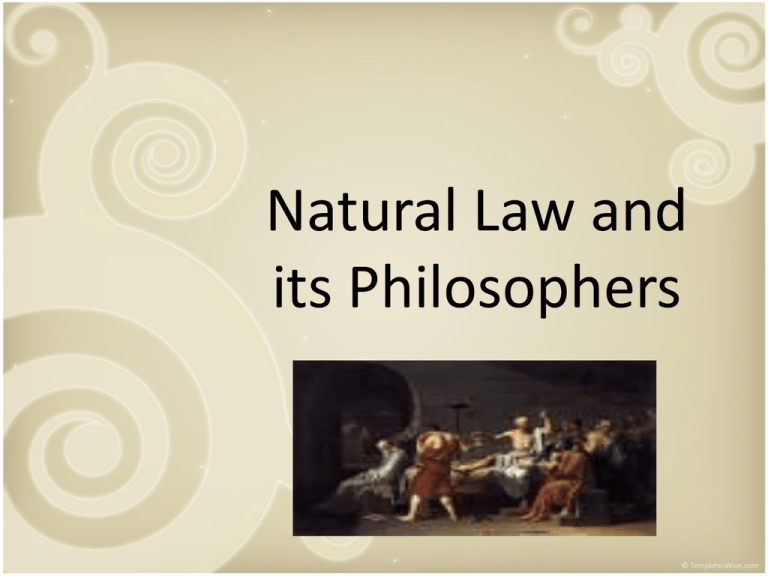
Natural Law and its Philosophers Natural Law • Natural Law: A paradigm that posits the existence of a law whose content is set by nature and that therefore has validity everywhere. (International Encyclopedia of the Social Sciences) par·a·digm 1. One that serves as a pattern or model. 2. A set or list of all the inflectional forms of a word or of one of its grammatical categories: the paradigm of an irregular verb. 3. A set of assumptions, concepts, values, and practices that constitutes a way of viewing reality for the community that shares them, especially in an intellectual discipline. It holds the belief that law has some higher or divine origin. The Players & their Philosophies Socrates (469-399 B.C.E.) • Highly influential Greek philosopher whose works were not written down but nevertheless influenced many to write about his philosophical views (i.e. student Plato) • He believed that there is a moral imperative in law which must guide people • defines justice as one of the cardinal human virtues • Citizens’ duty to argue against unjust laws Famous Quote… Socrates continued… • use of Socratic Method to create philosophies and expand knowledge socratic method a method of teaching by question and answer; used by Socrates to elicit truths from his students http://wordnetweb.princeton.edu/perl/webwn?s=socratic method • Was put on trial for charge of “criminal who corrupts the young and atheism” • 501 jurors who sentenced him to death • Believed that even in the face of death the law demands you to do what is morally right and avoid what is wrong Plato (427-347 B.C.) Plato (427-347 B.C.) • Immensely influential ancient Greek philosopher. • Plato studied under Socrates, wrote many philosophical dialogues, and founded the Academy in Athens where Aristotle studied. His work is often described as providing the foundation of western philosophy. • Idealism: Law should reflect certain universal, absolute or eternal truths and virtues • Even though humans could never fully achieve these eternal truths, their laws should attempt to do so. Plato continued… • The law should imitate nature (which is inherently good) • law makers should be servants of the law and aim for true happiness of citizens and laws should never be servants of government • Purpose of law is to act as a moral guide or educator for society • compliance of laws happen at first from fear of punishment, then out of habit and finally out of commitment to the values reflected in law • approach to applying law should be more situational and less rigid Aristotle (384-322 B.C.E.) • Student of Plato – often regarded as the father of natural law • Rationalism: the study of nature, guided by human reason, would reveal the true meaning of law. • We can come to understand God by examining His creation (i.e. the natural world – including human nature) Observation: Conclusion: Flowers need water Living things need Care Application: Law requires parents to care for their children Aristotle continued… • Unlike Plato, who believed people could only aspire to true justice but never achieve it, Aristotle believed humans could through reason and guided observation (Rationalism) • Effect of law is to make people good by habituating them to do good • People would only follow law for fear of consequences Aristotle’s “Virtue Ethics” • According to Aristotle, “virtue” describes how well something does what it is meant to do. • Example: The virtuous eye is the eye that sees, because eyes are meant to see. • The virtuous man, therefore, is the man that does what he is meant to do. Thus, happiness is best achieved through leading a virtuous life and doing what man is intended (by God) to do. Criticism: “Virtue Ethics” • Criticized today for going too far in deriving “laws of the universe from simple observation and over-stretched reason” • Such thinking without sufficient facts is ineffective (scientific method) and more experimentation is needed to support this view. Cicero (106-43 B.C.E.) • Roman philosopher • law was seen by Romans as a way of justifying their authority & expanding their empire • “Law is the mind and reason of intelligent man, the standard by which justice and injustice are measured.” • Cicero believed that the ultimate law was still bound by natural principles Cicero continued… • However, civil or human laws should be set aside if, in the minds of wise men, they contradict the laws of nature. • Advocated civil disobedience to compel lawmakers to reform laws that failed to conform with laws of nature (nature being represented by activities that were in the common good) During the MIDDLE AGES • Legal philosophy was heavily influenced by the Catholic Church, a unity of spiritual and earthly worlds • ‘Canon Law’ developed as a result to rule over all civil laws Justinian (483-565 C.E.) • Roman Emperor and philosopher who ruled 527-565 • Believed that law could be divided into two parts: 1) universal laws of nature, and 2) civil laws • Natural law in Justinian’s view, ensured that people were born free. Therefore, laws that permitted slavery were a violation of natural law. Justinian Justinian continued… • In 528 Justinian appointed a commission to draft a set of new constitutions to gather all Roman law into one Code ~ The Justinian Code which was divided into four parts: 1. The Institutes: a textbook in law for students 2. The Digest: a casebook covering many trials and decisions 3. The Codex: collection of statutes and principles 4. The Novels: new proposed laws This legal code became the foundation of law in most western countries St. Thomas Aquinas (1225-1274 C.E.) • Dominican monk who identified with Aristotle’s view on law and adapted it for Christian philosophy • Law is the mirror of the natural world order made known to humans via their own reasoning and divine revelation through Christian prophets • People are bound by conscience to obey law • Because of his belief that justice and rights sprang from natural law, he is credited with having a major influence on modern human rights theories and laws St. Thomas Aquinas continued… Developed four types of law: 1. Eternal Law: never changing 2. Natural Law – eternal law that operates in humans 1. Divine Positive Law – law revealed in Scripture 2. Human Positive Law – laws for functioning society Eternal Natural Human Stay Tuned…. …For Positive and Modern Theories tomorrow



